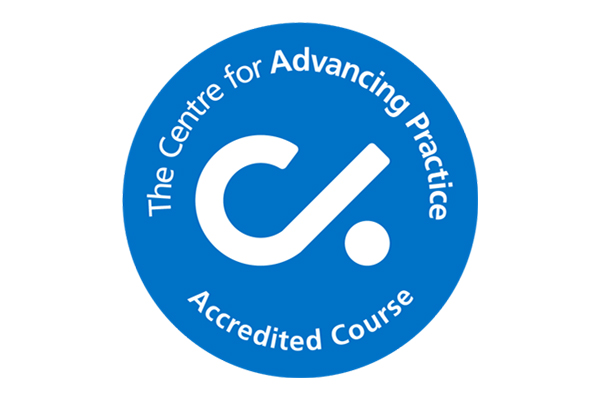Module Overview
This is the first of three capability in practice modules, corresponding to the first year of study.
This module allows learners to demonstrate their capabilities in practice and growing levels of entrustment through a mix of core capability statements and individually negotiated capabilities. These capabilities will be assessed by a suitably qualified workplace supervisor meeting the minimum standards for advanced practice supervision (Health Education England, 2022)
Practitioners can develop and evidence the underpinning core and generic competencies required for a benchmark of practice to protect the public, alongside individually negotiated specialist competencies applicable to their specialty or subject area, i.e. the knowledge, skills, and behaviors relevant to their setting and job role.
These may be demonstrated in varying ways specific to the profession, role, population group, setting, and sector.
Module Overview
This module consolidates approaches to leadership which will have been introduced in other modules as part of your advanced practice journey.
The module has been designed to support the understanding and application of ethical and professional perspectives on leadership, to inform future advancing practice. Students can relate the theoretical perspectives and new learning gained throughout the module to their own clinical area.
This module will contribute to the development of a linear practice portfolio of evidence for students to demonstrate their achievement of ACP competencies.
Module Overview
This is the second of three capability in practice modules, corresponding to the second year of study.
This module aims to allow learners to demonstrate their capabilities in practice and growing levels of entrustment through a mix of core capability statements and individually negotiated capabilities. These capabilities will be assessed by a suitably qualified workplace supervisor meeting the minimum standards for advanced practice supervision (Health Education England, 2022).
Module Overview
This is the final of three capability in practice modules, corresponding to the last year of study.
This module allows learners to demonstrate their capabilities in practice and growing levels of entrustment through a mix of core capability statements and individually negotiated capabilities. These capabilities will be assessed by a suitably qualified workplace supervisor meeting the minimum standards for advanced practice supervision (Health Education England, 2022)
Learners whose capabilities in practice meet a pass level of entrusted activity in all three capabilities modules will be eligible to have their details submitted to the Health Education Centre for Advancing Practice as suitable for the Digital Badge confirmation of credential which is proof of practicing at this level.
Module Overview
This module is designed to consolidate the skills students have developed across the four pillars of advanced practice.
During this module students can critically evaluate how they undertake their advanced practice role in relation to their own practice, exploring their holistic understanding of the complexity, ambiguity, and uncertainty that characterises complex advanced professional practice. Students should also demonstrate critical thinking, high-level evidence-based decision-making, problem-solving, and patient-centred care.
This module also provides an opportunity for those working in an advanced level of practice to integrate, synthesise, and demonstrate the application of knowledge around an area of specialism through the development of a case study. The case study can exemplify clinical complexity and further demonstrate the advanced skills of clinical reasoning, differential diagnosis, formulating a management plan, including investigations, and evidence-based patient-centred care. The case study will demonstrate autonomous practice in relation to the pillars underpinning advanced clinical practice including clinical management, education, leadership, and research.
The case study will be presented to a panel who will have the opportunity to ask questions or seek clarification.
Module Overview
This module builds on the foundational knowledge and skills acquired in the introductory modules, focusing on preparation to apply research in clinical practice. Participants can outline a proposal to critically evaluate and audit their own and others' clinical practice, selecting and applying valid and reliable methods. They can also develop the ability to facilitate collaborative links between clinical practice and research through proactive engagement and networking.
Module Overview
The Research Methods module is designed as an introduction to research for healthcare professionals working at the level of advanced clinical practice. The module aims to develop students’ skills and knowledge in engaging in research activity and adhering to good research practice guidance. The module seeks to enable participants to critically evaluate and develop evidence-based strategies which can lead to enhanced quality, safety, productivity, and value for money in their clinical practice.
Module Overview
This practice-focused module aims to equip students with the skills and knowledge to take a comprehensive patient history and thorough physical and psychological assessment. It also allows students to recognise the interconnectivity of pathophysiology, physical symptoms, and psychological responses.
Developing these skills can allow you to meet the core and generalist capabilities in practice for a broadly based advanced healthcare professional. It may also enable you to contribute autonomously to the holistic management of acute and chronic disease states in both primary and generalist secondary care practice.
By the end of the module, you should feel comfortable to clinically examine the major systems of the body, assess psychological state, and develop an initial impression to inform clinical decision making.
Module Overview
This module provides an opportunity for those working in an advanced level of practice to integrate, synthesise, and demonstrate the application of knowledge around an area of specialism through clinical case presentation in the workplace.
The aim of this module is to provide students with the means to develop a professional recognition portfolio that demonstrates learning through a series of self-assessments, critical reflections and case studies.
The portfolio will be personal to each student and should challenge them to engage in a critical review on their own professional practice and demonstrate understanding of the limitations of their own role.
Module Overview
Clinical reasoning is central to the ability of an advanced practitioner to manage undifferentiated or undiagnosed presentations in healthcare practice and can be broken down into a range of different skills, processes, and philosophical perspectives.
Advanced practitioners need to be aware of the range and variety of information informing their decision making, and actively consider how they select and evaluate information, request additional data in the form of investigations and other perspectives, and finally integrate into a reasoned plan of action.
By blending physical examination skills and knowledge of biological processes within a range of information from different perspectives, this module supports the development of metacognitive skills and wider biopsychosocial perspectives to inform decision making. The module’s ultimate aim is to develop reflexive and considered decision making in partnership with people receiving care, and will encourage students to critically explore how they manage large volumes of contextual information to make decisions in the context of multiprofessional advanced practice.
Module Overview
Continuing Professional Development is a core activity for all working in health and care services. Development activities can take many forms outside of formal higher education programmes. Reflect on and re-evaluate developmental activities undertaken in your career in depth and apply personal development planning to work out the next steps in your progression with this individually focused module.
Module Overview
This module is designed to provide a sound underpinning knowledge base in relation to pharmacology, pharmacokinetics, and pharmacodynamics. The emphasis is on applied therapeutic interventions, essential for safe, competent prescribing within the student’s scope of practice and professional competence.
Pre-existing knowledge and skills will be built upon to develop consultation skills and styles. Students can explore and develop effective communication and evaluation of evidence-based practice and shared decision making to ensure safe, meaningful, and concordant relationships with patients and carers.
Students may further develop an understanding and application of legal, ethical, and professional perspectives to inform future prescribing practice related to their own specialist field and clinical area. Learning in practice is central to the module with the formulation of a portfolio of practice learning to demonstrate achievement of the Royal Pharmaceutical Society competency framework and provide a tool for future continued professional development. The module has been mapped to the RPS Competency Framework.
Module Overview
The module seeks to facilitate individual responsibility for learning and evaluation of progression within the planned activity, fully embracing the concept of ‘Student as Producer’ of their own knowledge.
Students will be required to discuss their ideas for the area of study with the programme lead prior to beginning the module to ensure access to suitable support. Students will share their learning in a live assessment allowing them to evidence application of learning to practice.
Module Overview
This module explores the fundamental and key aspects of assessing, managing and treating children and young people who present to a range of primary and acute healthcare settings. The module aims to further develop healthcare practitioners’ skills and knowledge relating to the specific issues inherent in clinical decision-making, organisation and escalation when working with children and young people and their families.
Module Overview
This module has been designed to provide individuals working in Health and Social Care with a solid understanding of the principles of learning, teaching, and assessment. These principles can help participants to effectively carry out their educational duties in both academic and practice settings, to both peers and service users. The content has been mapped to the UK Professional Standards Framework (UK PSF) for teaching and supporting learning in higher education (2011) and the Academy of Medical Educators (AoME) Professional standards for medical, dental, and veterinary educators (2014).
Module Overview
This module provides the practitioner with the knowledge and skills required to proactively support the holistic care and treatment of individuals with long term health and social care needs, within their field of professional practice. The module will focus on enabling individuals to take greater control of their care and offering opportunities for better health and wellbeing, through personalised care planning, increased prevention strategies and supported self-care (NHS, 2014).
Students will be expected to independently synthesise and apply their clinical skills and knowledge to the context of their own professional practice.






